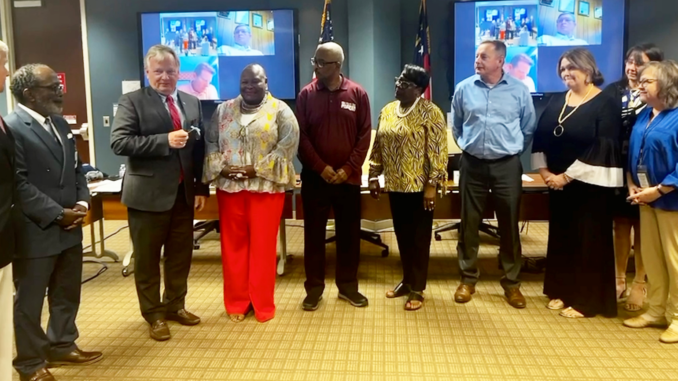
RALEIGH — At its Sept. 12 meeting, the Local Government Commission (LGC) officially returned financial control to the town of Robersonville.
The LCG is housed under the state treasurer’s office and is tasked with tracking the financial well-being of 1,100 local government units while providing guidance on statutory requirements and other assistance.
State Treasurer Dale Folwell, who chairs the LGC, presented the town’s mayor with a symbolic key to the city during a recognition ceremony. The LGC assumed control over the 1,300-person town’s finances in October 2020 after it failed to submit required audits and did not create a plan to rectify various accounting and finance issues.
“We have 549 mayors in North Carolina. Mayor (Tina) Brown stands out because she came before the commission in 2020 and thanked the LGC staff for making a difficult choice that was in the best interest of her town and her constituents,” Folwell said. “We never want to assume financial control of a town and don’t take that decision lightly. But we are blessed with great staff that can step in immediately to fix broken systems.”
Folwell added that when Brown ran for mayor she had “no idea the town was in the condition it was in” but did the right thing engaging with the LGC.
“We weren’t expecting to have to surrender our town to the state, but I am glad that we went through what we went through because it makes us better and stronger, and it just shows that we are resilient,” Brown said. “And this is just the beginning.”
Deputy Treasurer Sharon Edmundson, who heads DST’s State and Local Government Finance Division, said returning control to the town “doesn’t mean we’re just walking away” and that the state will be available to assist the town going forward.
The towns of Roxboro and Belhaven, which are on the Unit Assistance List due to late audits and financial issues, were approved for certain vehicle purchases.
Roxboro, located in Person County, was approved for $544,000 to replace a 22-year-old fire truck that must be taken out of service in three years. Belhaven, located in Beaufort County, was approved to buy one police vehicle and three work trucks through a $160,000 installment purchase.
Items on the agenda approved by the LGC included:
Charlotte Douglas International Airport — $475 million in revenue bonds for a major expansion of the terminal, various capital projects and refinancing of existing debt. Also approved was a $280 million bond in anticipation note (BAN) to begin a variety of projects on the airport’s capital improvement plan. BANs are short-term, interest-bearing securities that can be repaid through a long-term bond issue.
Charlotte’s Spectrum Center — A $110 million in BAN approved for renovations and energy efficiency upgrades as well as for improvements to a fire station.
Durham — $138 million in limited obligation bonds to fund new facilities and for improvements to streets, parks and recreation, a fire station and public safety, sidewalks, IT infrastructure, public works and general facility repairs. The financing also will refund $5 million in 2013 bonds for savings.
Inlivian Housing Redefined (Mecklenburg County) — $24.5 million in conduit revenue bonds related to a construction project for a 100-unit housing development for seniors and families.
The Raleigh Housing Authority (Wake County) — $21 million in conduit revenue bonds for a loan to Terrace at Rock Quarry Limited Partnership to finance a portion of the cost to acquire, build and equip a 132-unit, low-income multifamily rental housing development to be called Terrace at Rock Quarry.
Holly Springs (Wake County) — $17 million in limited obligation bonds to build a new fire station, purchase a fire truck and street work for a new operations center.
New Bern (Craven County) — $10 million installment purchase to build a new Stanley White Recreation Center. The city was approved for a separate revenue bond of $6.1 million for sewer system infrastructure.
Town of Maiden (Catawba and Lincoln counties) — $7.5 million installment to build a new fire station on Main Street.
Mount Pleasant (Cabarrus County) — $6 million in interim financing with U.S. Department of Agriculture revenue bonds for a regional pump station and to rehabilitate sewer lines and manholes.
Conover (Catawba County) — $4.9 million for wastewater treatment equipment.
Oxford (Granville County) — $4.8 million project for wastewater treatment plant improvements and $1.5 million for sewer system improvements.
The town of Apex (Wake County) — $3.46 million to build a new municipal building for the Planning and Inspection departments.
Middlesex (Nash County) — $839,000 for rehabilitation of its wastewater collection system.
The long-running debate over New Hanover County’s “Project Grace” continued with LGC members having a discussion only about the project with the county’s commissioners and staff, and a vote is set for the LGC’s October meeting.
Project Grace involves a request for a 95,000-square-foot space to house a museum and library in downtown Wilmington.
Last September, New Hanover County applied for LGC approval of a more than $80 million 20-year lease purchase for the facility. At that September meeting, the motion to approve the project failed to get a second after a long discussion on the issue by LGC and officials for New Hanover County.
“There is nothing graceful about Project Grace,” Folwell said during his monthly call with the media.
He went on to say that everything related to Project Grace was “taken from the Zimmer family” and given to Cape Fear Commercial Realty run by Brian Eckel.
“If you follow the trail, there is a pattern of profits here of the five to six or seven transactions that I’ve been involved in in the last seven years with either the City of Wilmington, the community college or the county of New Hanover,” said Folwell. “Brian Eckel’s fingerprint is on every single one of those.”
Folwell also criticized the lack of interest in utilizing surplus properties the county has for sale for Project Grace as well as the actions taken in “sealed bids.”
“When you look at who actually gets the brokerage fees, who does the placement, and, at the end of the day, what you’re going to see is a pattern of profits of one individual’s fingerprint on all these transactions,” Folwell said.


